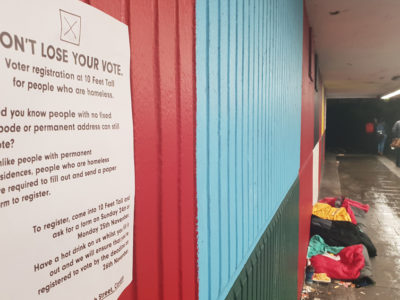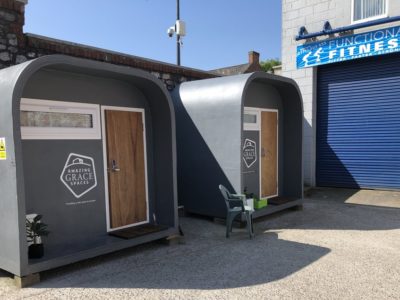Living modularly
The shipping container projects were announced two years ago.
They have been labelled as innovative living spaces by Cadwyn and the council. Benefitting from solar energy, transforming the containers into homes has a sense of virality to them and could lend itself easily to the zeitgeist of eco-living quite well.
This however remains a far cry from the reality of the situation in Cardiff and beyond.
The use of shipping containers as modular homes has been trailed in Merthyr and four were erected in Wrexham last Christmas to alleviate the plight of rough sleepers in the city.
From what I’ve seen at Greenfarm, and from the mock-ups online, there are to be separate spaces for communal and private areas, like a kitchen and dining area, and a bathroom.
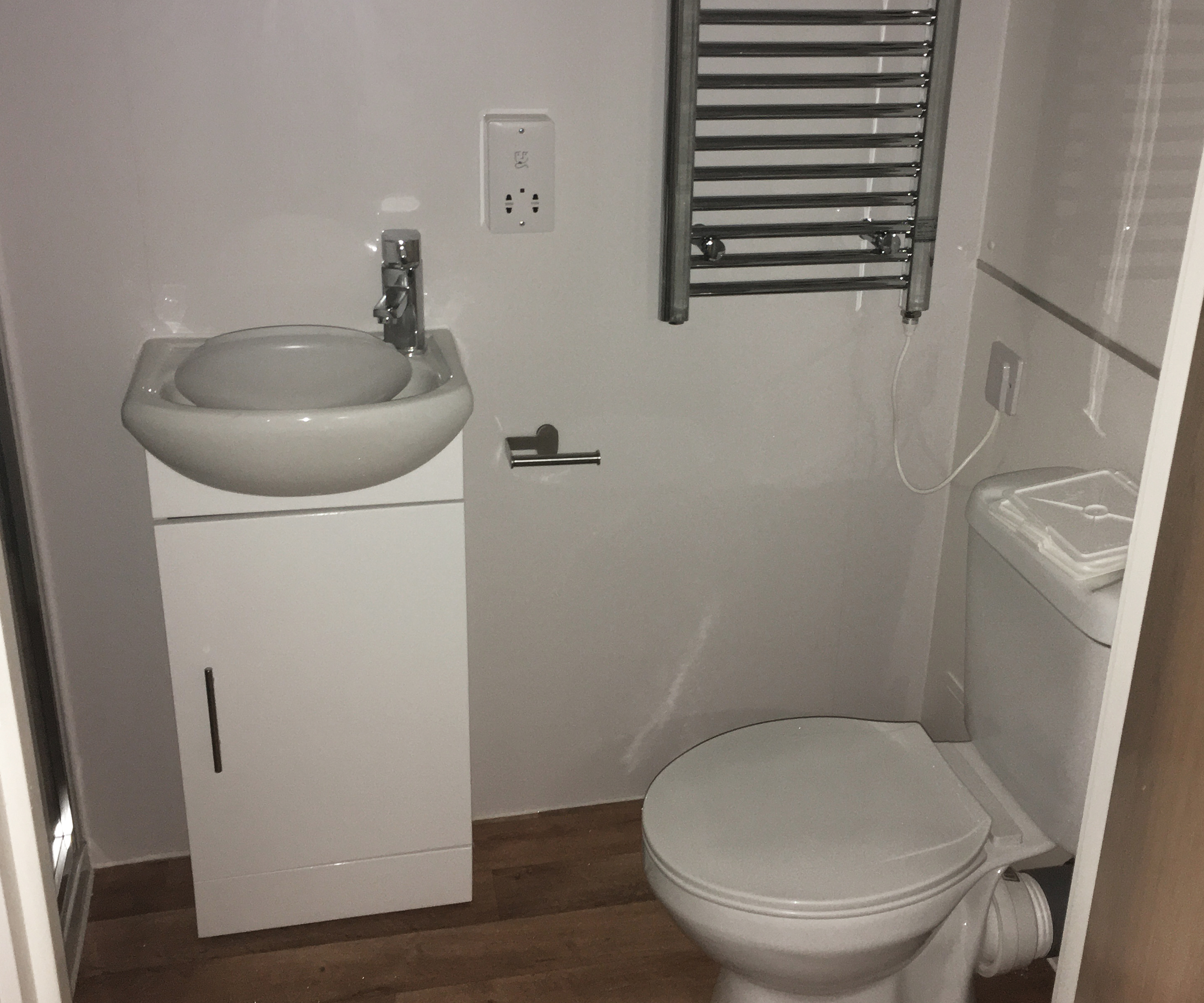
What the bathroom of a Greenfarm container is looking like currently
The seven two-bedroom homes on the Bute Street site will be made from a combination of 40ft and 20ft containers, whereas the six one-bedroom homes will be made from 40ft containers.
The eight 40ft containers at the Greenfarm site are being delivered fully built, with kitchen appliances and plumbing attached, as opposed to the Bute Street containers which will be fitted on site.
A duty of care
Cllr Thorne and Helen often mention a duty of care towards homeless people. Housing is a devolved power in Wales. The Housing Act of 2014 reformed regulation in the private sector and the law on homelessness.
The main objective of the law is to ensure people who are homeless or facing homelessness, meaning they are about to be without a home within 56 days, receive help as early as possible. It places a duty on local authorities to work with these people and find them adequate relief; via a review and a strategy.
Helen is critical of the government and local authorities, “Whatever the government have done in terms of policy has made this problem terrible. None of these people are classed as priority.”
The Act defines being homeless as when there is no accommodation available for the person’s occupation.
A person is also defined homeless if they are accommodated in a moveable structure which is not reasonable for the person to continue to occupy, i.e. shipping containers.
So, those homed in the containers will still be regarded as homeless, meaning that the containers must not become a permanent solution.
Homelessness in Wales 2018-19
Among the warbling legalese on housing and homelessness in Wales, the numbers remain sobering.
Welsh Government statistics show an 18% increase in households threatened with homelessness in 2018-19. 10,737 Welsh families are now threatened with homelessness. In 38% of cases, when a need was established, the threat of homelessness was not relieved, and the duty was ended.
During 2018-19, 2,361 households were accepted as being unintentionally homeless hence being in priority need and were owed a duty for accommodation to be secured.
Priority need categories, like mental health problems and fleeing domestic abuse have been increasing.
The main reasons people are without a home are as follows:
- A loss of rented or tied accommodation (main reason for those threatened with homelessness)
- A parent, relative, or friends were no longer willing to accommodate (main reason for homelessness)
- Unable to pay rent or mortgage
- Breakdown of a relationship with a partner
The number of households in temporary accommodation was up 8% on the previous year. 2,226 households are placed in temporary dwellings.
Cardiff continued to record the highest rate and highest number of households, 630, in temporary accommodation in Wales. Although not used in Cardiff, the number of families temporarily homed in B&Bs increased across the country.
For households in hostels and refuges, 21% are families with children.
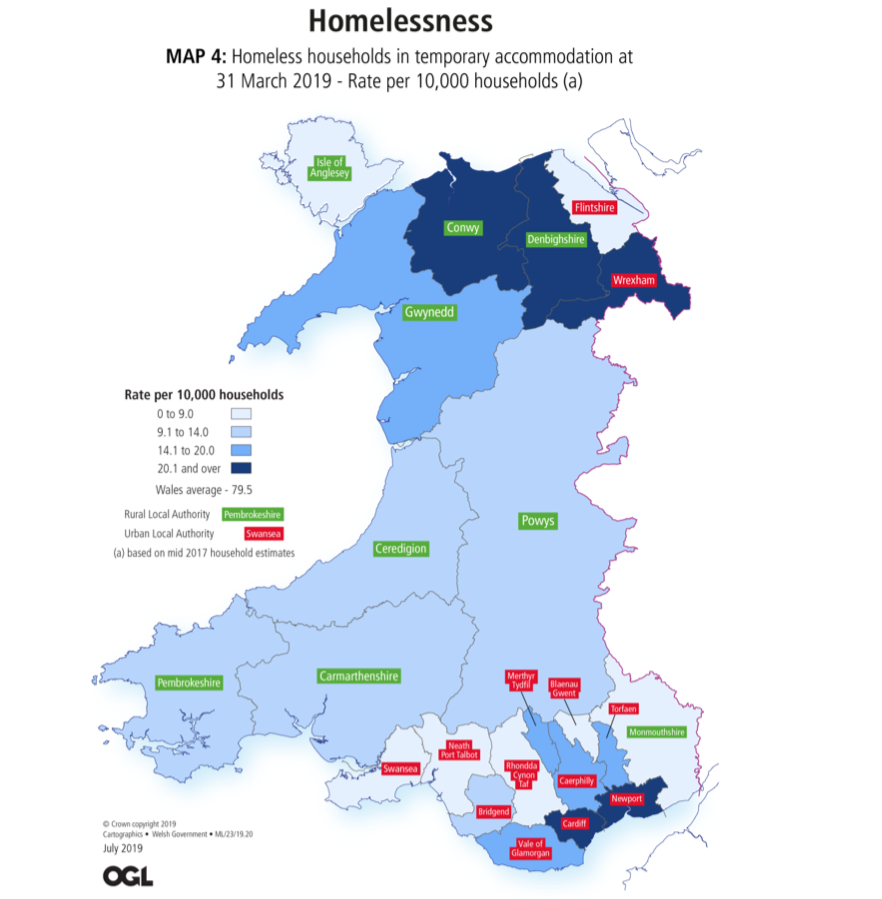
Infographic map showing that Cardiff is one of the highest Welsh regions for people living in temporary forms of accommodation
Applying for social housing
You can apply for social or council housing by contacting the local council, by telephone or visit your local hub in person.
In most cases across the country, housing demand strips supply and so a points based system operates, like bands, where priority is given to people depending on their circumstances and level of housing need (band A being of most need).
Here are some of the individuals defined by law as having a priority need to housing in Wales:
- pregnant women
- dependent children
- someone vulnerable as a result of old age, mental illness, handicap or physical disability
- someone homeless or at the risk of becoming homeless
- young people aged 18-21 at risk of financial or sexual exploitation
- anyone who has fled domestic violence or is at threat of domestic violence
More information can be found on Dewis Cymru’s website.
To help deal with the thousands on housing waiting lists, the council has installed shipping containers to be used as temporary accommodation

Social housing, and the lack thereof, is at such a crisis in the UK that over 125,000 children are living in temporary forms of accommodation, without a home to call their own.
More than 10,000 Welsh families are threatened with homelessness. In Cardiff, there are currently 8,000 people on a waiting list to be homed in the city. There are only 1,700 available vacancies. Greenfarm Hostel has seen situations where it was so full, homeless families had to use the office space for refuge.
As such, Cardiff council has announced plans to provide a solution; the installation and renovation of shipping containers, to temporarily accommodate families who find themselves homeless.
Councillors and responsible building associations promise these containers will provide adequate space and facilities to accommodate families waiting for a permanent home. Some see it as an innovative solution for the here and now. Others see it as prolonging the desperate issue of homelessness in the city.
Ship shape?
“The containers themselves will actually provide improved conditions for families who present themselves as homeless,” says Cllr Lynda Thorne, cabinet member for Housing and Communities. She tells me that all costs associated with the upkeep of the containers will be covered within the rent which will be paid through residents’ benefits.
Eight containers are being assembled as an extension of Greenfarm Hostel in Ely, to deal with the increase in numbers. Hostel staff will be on hand to provide support to residents accommodated in the containers.
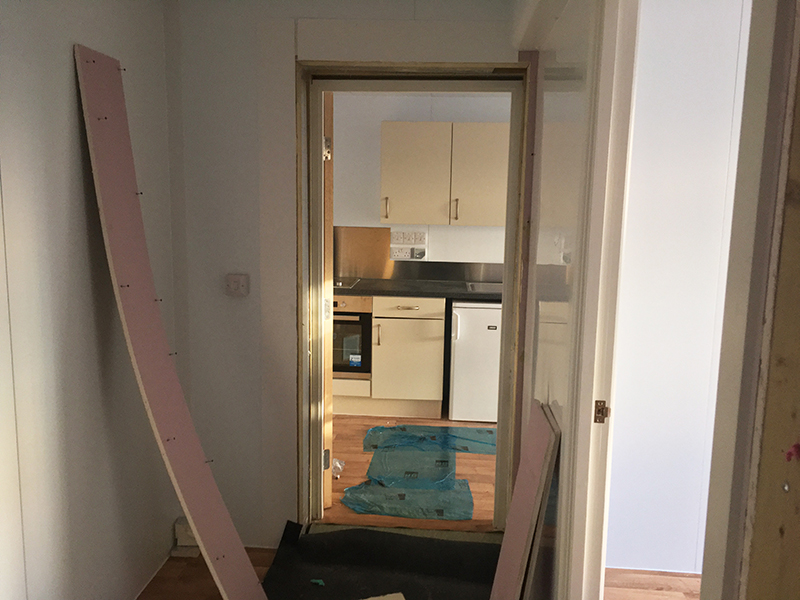
More containers are currently held at a site on Bute Street, due to be open for tenancy in January 2020. Funded by the Welsh Government, the 13 containers on the site will make up seven two-bedroom flats and six one-bedroom flats over two storeys.
Cadwyn, the responsible housing association, says the containers have all the specifications of a modern affordable home and are designed intelligently to maximise the use of space. Their website states that support for residents will be provided where necessary. They have been approached for further comment.
The response
Announcing the installation of the Greenfarm shipping containers on Twitter, Cardiff council faced heavy criticism, with many citing the empty houses around the city as better solutions. One reply stated that the shipping containers are a symptom of an utterly broken housing system and that no family should have to spend Christmas in a metal box.
This is not great news. Just news.
— Benjamin Hale (@B_Halstrom) November 16, 2019
Let me make it clear. This is NOT a solution. But a symptom of an utterly broken housing system.
No family should spend Christmas in a metal box.
A spokesperson from Shelter Cymru, one of Wales’ many homelessness charities, said, “It is appalling that our housing system is so broken that shipping containers are being used as accommodation.
“Whether they meet people’s needs can only be decided by people who are living in them. Any form of temporary living situation is detrimental to families’ wellbeing,” the spokesperson added.
Kath Jones found herself homeless in her 20s after a tough upbringing. She has had experiences with temporary accommodation in Merthyr and Tredegar. Speaking to BBC Wales, she said, “I didn’t feel safe. To be honest, I didn’t want to be alive.”
On the contrary, Helen Lloyd welcomes the shipping containers as a quick and fast solution for the here and now. “People are always wary of new initiatives,” says Helen, who was made homeless 13 years ago due to a family breakdown. She now works for the charity Amazing Grace Spaces, who, among other things, provide temporary accommodation in the form of pods for rough sleepers in Newport.
“Any form of temporary living situation is detrimental to families’ wellbeing”
The pods provided a small safe refuge for rough sleepers, with a bed and toilet facility. They were taken away by the local council who wanted more safety checks and planning permission. She claimed that the council didn’t even look at the pods. “The council say they have a duty of care to house those who are in need. That’s not being done. If you don’t fit into their box, they don’t need to help you,” she added.
Affordable housing?
Helen told me that the lack of affordable accommodation for young people is the real problem. Shelter Cymru says that temporary accommodation in general does not provide families with adequate stability, “We urgently need to build more social housing so we can get families into permanent homes as quickly as possible, and we need to prevent families becoming homeless in the first place.”
Building of more social housing is something which is firmly on the council’s agenda. Cllr Thorne says there is a programme to build 2,000 council homes, with at least 1,000 built by 2022. “This is still a drop in the ocean,” she says. From the 8,000 on the waiting list then, many families will still be left without a home.
Look to this explainer video for a summary of all the key elements surrounding the build of shipping containers in the Welsh capital
The shipping containers can be regarded as an innovative way to temporarily home families who find themselves homeless or threatened with homelessness. Yet, there is a long way to go if the issue is to be solved in the city.
The harsh reality is that there is no real permanent solution for the thousands of people who find themselves homeless in Cardiff, except to impart on a vast programme of house building and a re-definition of affordable housing.
Although more attractive than an office space in a hostel, or even sleeping on the streets, it’s hard to imagine a family living in a container, whatever their situation. If the Greenfarm containers are finished in time, which is unlikely, ‘Christmas in a metal box’ may be the reality facing some families in the next few weeks.
Living modularly
The shipping container projects were announced two years ago.
They have been labelled as innovative living spaces by Cadwyn and the council. Benefitting from solar energy, transforming the containers into homes has a sense of virality to them and could lend itself easily to the zeitgeist of eco-living quite well.
This however remains a far cry from the reality of the situation in Cardiff and beyond.
The use of shipping containers as modular homes has been trailed in Merthyr and four were erected in Wrexham last Christmas to alleviate the plight of rough sleepers in the city.
From what I’ve seen at Greenfarm, and from the mock-ups online, there are to be separate spaces for communal and private areas, like a kitchen and dining area, and a bathroom.

What the bathroom of a Greenfarm container is looking like currently
The seven two-bedroom homes on the Bute Street site will be made from a combination of 40ft and 20ft containers, whereas the six one-bedroom homes will be made from 40ft containers.
The eight 40ft containers at the Greenfarm site are being delivered fully built, with kitchen appliances and plumbing attached, as opposed to the Bute Street containers which will be fitted on site.
A duty of care
Cllr Thorne and Helen often mention a duty of care towards homeless people. Housing is a devolved power in Wales. The Housing Act of 2014 reformed regulation in the private sector and the law on homelessness.
The main objective of the law is to ensure people who are homeless or facing homelessness, meaning they are about to be without a home within 56 days, receive help as early as possible. It places a duty on local authorities to work with these people and find them adequate relief; via a review and a strategy.
Helen is critical of the government and local authorities, “Whatever the government have done in terms of policy has made this problem terrible. None of these people are classed as priority.”
The Act defines being homeless as when there is no accommodation available for the person’s occupation.
A person is also defined homeless if they are accommodated in a moveable structure which is not reasonable for the person to continue to occupy, i.e. shipping containers.
So, those homed in the containers will still be regarded as homeless, meaning that the containers must not become a permanent solution.
Homelessness in Wales 2018-19
Among the warbling legalese on housing and homelessness in Wales, the numbers remain sobering.
Welsh Government statistics show an 18% increase in households threatened with homelessness in 2018-19. 10,737 Welsh families are now threatened with homelessness. In 38% of cases, when a need was established, the threat of homelessness was not relieved, and the duty was ended.
During 2018-19, 2,361 households were accepted as being unintentionally homeless hence being in priority need and were owed a duty for accommodation to be secured.
Priority need categories, like mental health problems and fleeing domestic abuse have been increasing.
The main reasons people are without a home are as follows:
- A loss of rented or tied accommodation (main reason for those threatened with homelessness)
- A parent, relative, or friends were no longer willing to accommodate (main reason for homelessness)
- Unable to pay rent or mortgage
- Breakdown of a relationship with a partner
The number of households in temporary accommodation was up 8% on the previous year. 2,226 households are placed in temporary dwellings.
Cardiff continued to record the highest rate and highest number of households, 630, in temporary accommodation in Wales. Although not used in Cardiff, the number of families temporarily homed in B&Bs increased across the country.
For households in hostels and refuges, 21% are families with children.

Infographic map showing that Cardiff is one of the highest Welsh regions for people living in temporary forms of accommodation
Applying for social housing
You can apply for social or council housing by contacting the local council, by telephone or visit your local hub in person.
In most cases across the country, housing demand strips supply and so a points based system operates, like bands, where priority is given to people depending on their circumstances and level of housing need (band A being of most need).
Here are some of the individuals defined by law as having a priority need to housing in Wales:
- pregnant women
- dependent children
- someone vulnerable as a result of old age, mental illness, handicap or physical disability
- someone homeless or at the risk of becoming homeless
- young people aged 18-21 at risk of financial or sexual exploitation
- anyone who has fled domestic violence or is at threat of domestic violence
More information can be found on Dewis Cymru’s website.



